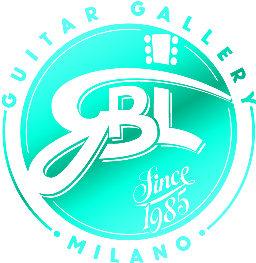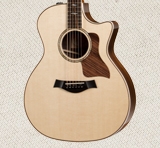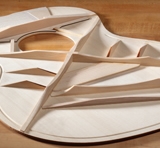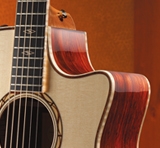
Shape Grand Auditorium
Number of Strings 6
Back/Side WoodLayered Rosewood
Scale length 25-1/2″
Top Wood Sitka Spruce
Body Length 20″
Electronics Expression System-T®
Body Width 16″
Cutaway Venetian
Body Depth 4 5/8″
Nut & Saddle Nubone Nut/Tusq Saddle
Neck Width 1-11/16″
Neck/Heel Sapele
Bracing Forward Shifted Pattern
Fretboard Wood Ebony
Fretboard Inlay 6mm Dots
Headstock Overlay Indian Rosewood
Binding White
Bridge Inlay None
Bridge Pins Black
Tuners Die-Cast Chrome
Truss Rod Cover Black Plastic
Back/Side Finish Satin
Top Finish Gloss
Neck Finish Satin
Pickguard Tortoise
Case Hard Bag
Number of Frets 20
Armrest Binding None
Back Config Laminate
Backstrap Wood None
Backstrap Finish None
Brand of Strings Elixir Phosphor Bronze Light
Buttons Chrome
Edge Trim None
Fingerboard Ext None
Fretboard Binding None
Heel Cap Binding White
Heel length 3-1/2″
Peghead Finish Satin
Peghead Inlay None
Peghead Binding None
Peghead Logo Taylor Colorcore
Peghead Type Standard
Rosette Mat. Plastic
Rosette Size Three Ring
Stain/Sunburst None
Type of Neck Joint Scarf
Wedge None
The Dunwells – “I Could Be a King” Live at 35
Grand Auditorium Shape
Taylor’s signature shape embodies the ultimate all-purpose acoustic.
Our most popular and versatile body shape, the mid-size Grand Auditorium arrived in 1994 bearing refined proportions that fell between a Dreadnought and Grand Concert. While the bigger Dreadnought was traditionally considered a flatpicker’s guitar and the smaller Grand Concert catered to fingerstylists, the GA was designed to deliver on both fronts. The shape produced an original acoustic voice that was big enough to handle medium-strength picking and strumming, yet with impressive balance across the tonal spectrum, especially in the midrange, producing clear, well-defined notes that suited both strumming and fingerstyle playing. The GA’s overall presence tracks well with other instruments both in a studio mix and on stage, and singer-songwriters have embraced its utility both for composing and traveling with one guitar. Many people want a single guitar that can cover a variety of styles, which is why the GA continues to be our bestselling shape. If you want a great all-purpose guitar, the multi-dimensional GA won’t let you down.
Inside every Taylor guitar is an important source of its unique sound: bracing. Bracing exists to strengthen the top and back of the guitar, while also allowing enough flexibility and vibration to generate tone. Bracing patterns help “voice” a guitar.
Taylor guitars are known for their balanced tonal response, and our bracing plays a role in that. The way that each brace is shaped and positioned on the soundboard contributes detailed nuances that are so critical that even slight alterations of its design, profile or thickness can result in discernable differences in tone.
You’re likely to hear about “scalloped” bracing, which has become fairly standard on steel-string acoustics. Scalloping is a shaping technique that helps lighten the bracing to prevent it from being excessively bulky, which can restrict top movement.
X Bracing
All of Taylor’s bracing for steel-string models is a form of X-bracing. The “X” provides a continuous flow of strength from the upper bout to the lower bout, which provides rigidity in spite of the soundhole’s location in the middle of the soundboard. We currently offer several versions of X bracing:
Standard X (used on laminate models)
This is Taylor’s original X pattern, featuring scalloped braces. Standard X bracing is used on the Baby, Big Baby, GS Mini, 100 and 200 Series.
Standard II (used on the 300-700 Series)
This version shifts the X forward (closer to the soundhole) and incorporates Taylor’s patented relief rout (see description below). These refinements enable more of the top to vibrate, enhancing the tone.
Advanced Performance (used on the 800 Series)
As part of Taylor’s 2014 voicing refinements for the 800 Series, the bracing profiles and placement were customized for each body shape to optimize their inherent strengths. The bracing scheme also incorporates side braces, which add rigidity and help maximize top and back movement. The overall effect on all the shapes is greater warmth, midrange and sustain.
CV (used on the 900 Series and up)
This version incorporates the relief rout and additional refinements, including subtle contouring differences in the scalloping. In general, guitars with CV bracing sound fuller and fatter without giving up articulation. They are also slightly louder.
The Taylor Relief Rout
Our patented relief rout is a tone-enhancing voicing technique in which a groove is carved along the inside edges of the top. This groove is similar in function to the re-curve on a violin — it “loosens up” the edges of the top, generating extra flexibility without sacrificing structural integrity. We first began using this groove in 2002. The result is increased bass and volume with a balanced tone.
Woods
Sitka Spruce
Origin: Northwestern North America (Coastal Rainforests of Alaska and Canada)
Used On: Most models
As a guitar soundboard, or top, Sitka spruce is the tonewood standard of the modern era. It’s used on 85-90 percent of the guitars that Taylor makes. Its combination of strength and elasticity translates into a broad dynamic range, yielding crisp articulation and allowing for everything from aggressive strumming and flatpicking to fingerpicking. Sitka spruce is Bob Taylor’s personal favorite for an all-around great guitar.
Goes Well With: All styles of guitars and players.
Indian Rosewood
Origin: East India
Used On: The 700, 800, 900 Series Acoustic/Electrics, Acoustic 7, 8, & 9 Series, Laminate 200 Series
One of the most popular and traditional guitar woods of all time, rosewood takes the basic sonic thumbprint of mahogany (which has a strong midrange) and expands it in both directions. Rosewood sounds deeper in the low end and brighter on the top end (one might describe the treble notes as zesty, sparkly or sizzly, with more articulation). If you look at its frequency range visually, rosewood would appear to be more scooped in the middle, yielding less midrange bloom than mahogany. Like mahogany, rosewood’s vintage heritage has helped firmly establish its acoustic legacy. It’s a great sound in part because we know that sound. In some music circles in which preserving the traditional sound helps bring a sense of authenticity to the music — certain strains of Americana, for example — rosewood has an iconic status. Also like mahogany, rosewood is a versatile tonewood, which has contributed to its popularity. One can fingerpick it, strum it and flatpick it. It’s very consistent, so players can usually rely on it to deliver.
Goes Well With: Most applications. If you like a guitar with fuller low end and brighter treble (bluegrassers, for instance), rosewood will do the trick. Its high-end sizzle and clear articulation will benefit players with “dark hands”. If you’re looking for a traditional acoustic sound, a rosewood Dreadnought or Grand Auditorium is right up your alley.
Venetian Cutaway
Standard on all “ce” models in the 300 Series through the Presentation Series, the Venetian cutaway is known for its soft, round lines. The sloping peak of the cutaway will vary depending on the shape of the guitar. The Grand Concert, Grand Auditorium, and Grand Symphony have a steeper slope, while the Dreadnought and Jumbo are a bit flatter. Our Grand Concert nylon-string models also feature a subtle, flatter slope, while our 100 and 200 Series cutaway models incorporate our flattest slope.
The ES-2®
The Taylor Expression System® 2 (ES2) is a revolutionary pickup design that delivers the latest in Taylor’s ongoing innovation in acoustic guitar amplification. The heart of the Expression System 2 is Taylor’s patented behind-the-saddle pickup, which features three uniquely positioned and individually calibrated pickup sensors. The location of the sensors enables a more dynamic range of acoustic sound to be captured than ever before. Together with Taylor’s custom-designed “professional audio”-grade preamp, this system produces exceptional amplified tone and responsiveness. On stage through a PA, plugged into your favorite acoustic amplifier, or direct into recording software, the Expression System 2 faithfully conveys the voice of your Taylor guitar.










Be the first to review “SOLD TAYLOR 214 CE ES 2”
Devi essere connesso per inviare un commento.